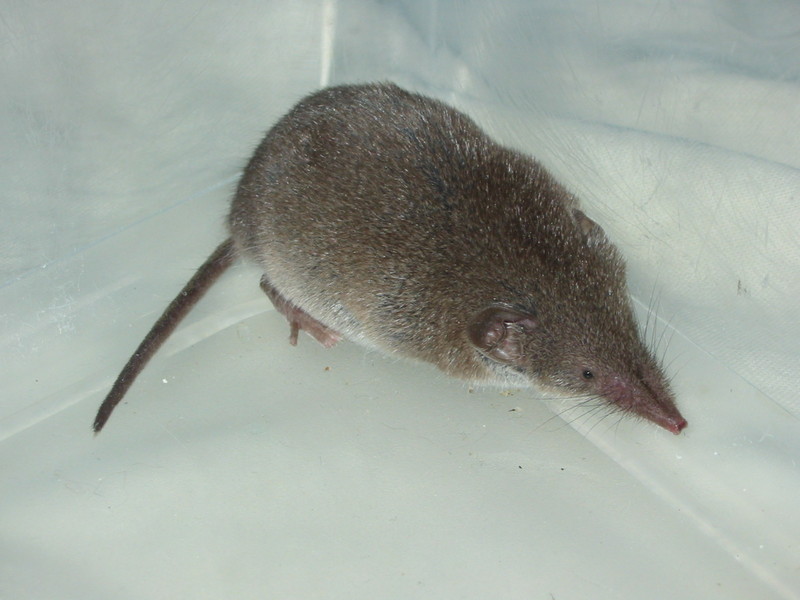|
| Query: The snout | Result: 2nd of 526 | |
Common Shrew (Sorex araneus) - Wiki
| Subject: | Common Shrew (Sorex araneus) - Wiki
| |

| Resolution: 1600x1200
File Size: 373245 Bytes
Date: 2007:05:27 20:23:15
Camera: Canon PowerShot A40 (Canon)
F number: f/4.8
Exposure: 1/60 sec
Focal Length: 518/32
Upload Date: 2007:12:26 10:02:05
|
ERROR : Server Busy(-1105)
ERROR : Server Busy(-1105)
Common Shrew (Sorex araneus) - Wiki
Common Shrew
From Wikipedia, the free encyclopedia
Order: Soricomorpha
Family: Soricidae
[Photo] Common Shrew (Sorex araneus). Date: 27 May 2007. Author: http://en.wikipedia.org/wiki/User:Sjonge Permission: Released into the public domain by the author.
The Common Shrew or Eurasian Shrew (Sorex araneus) is the most common shrew, and one of the most common mammals, throughout Northern Europe, including Great Britain, but excluding Ireland. The average shrew measures 55-82 mm in length and usually weighs 5-12 grams. Shrews are recognized by their velvety dark brown fur and pale undersides. Juvenile shrews have lighter fur until their first moulting, when darker winter fur grows in. The Common Shrew has small eyes, a pointed, mobile snout, and red-tipped teeth. The Common Shrew has a life span of approximately 23 months.
Shrews are active day and night, but mostly after dark. They are active most of the time, resting for only a few minutes between activities.
Territory
The Common Shrew is found in the woodlands, grasslands, and hedgelands of Britain, Scandinavia, and Eastern Europe. Each shrew establishes a home range of 370-630 metres for its entire lifetime. Males extend these boundaries only during breeding season, to find females. The Common Shrew is extremely territorial and becomes aggressive when another shrew enters a home range.
The Common Shrew makes its nest underground or under dense vegetation.
Diet
The shrew's carnivourous and insectivorous diet consists mostly of insects, slugs, spiders, worms, and carrion. Shrews need to consume 80-90% of their body weight each day in order to survive. A shrew must eat every two to three hours to achieve this goal. They do not hibernate in the winter months because their bodies are too small to hold sufficient fat reserves.
Shrews have poor eyesight, but use their excellent sense of smell and good hearing to locate food. Using these senses, a shrew can locate prey up to 12 cm deep in the soil.
Breeding
The Common Shrew breeding season lasts from April to September, but peaks during the summer months. After a gestation period of 24 to 25 days, a female gives birth to a litter of 5-7 shrews. A female usually rears 2-4 litters each year. The young are weaned and independent after 22 to 25 days.
Breeding is the only time that shrews do not prefer to be solitary. Young shrews often form a caravan behind the mother, each carrying the tail of the sibling in front with its mouth.
Protection and population
The Common Shrew is not an endangered species, but is protected by the Wildlife and Countryside Act of 1981. It is an offence in Britain to kill a shrew without a licence.
In Britain, shrews can be found at densities up to one per 200 square metres in the woodlands. These population numbers are controlled by owls, weasels, stoats, and foxes, which prey on the common shrew. A liquid produced by glands on the skin make shrews rather unpleasant tasting to domestic cats.
There has been a recent decline in common shrew populations due to increased use of herbicides.
http://en.wikipedia.org/wiki/Common_Shrew
| The text in this page is based on the copyrighted Wikipedia article shown in above URL. It is used under the GNU Free Documentation License. You may redistribute it, verbatim or modified, providing that you comply with the terms of the GFDL. |
|
Comments |
|---|
| | Paige Sopha |
|
| I found a shrew outside my house, I figured it was a baby. Its more grey than brown. It was hardly moving when i brought it in. Now i have it in a warm place and feed it peanuts and puppy milk. It is surrounded in dirt to try to make it seem like its natural habitat. It eats from my dropper. I want to keep it alive so could anyone give the right information to do so. My email is pkindred@dqbullsgap.com. PLease get back with me. |
| | Paige Sopha |
|
| The animal I found looks just like the picture but i dont think mine has ears. Not visible atleast. Is it still a shrew mole ? |
| | Guest |
|
| I have a shrew around my house what should I do with it. If they eat slugs that is great. |
| | Guest |
|
The common shrew (Sorex araneus), also known as the Eurasian shrew, is the most common shrew, and one of the most common mammals, throughout Northern Europe. Sorex araneus is one of the rare venomous mammals. The common shrew has small eyes, a pointed, mobile snout and red-tipped teeth. It has a life span of approximately 14 months.
Order: Eulipotyphla > Family: Soricidae > Genus: Sorex > Species: Sorex araneus > Synonyms: Sorex europaeus |
^o^
Animal Pictures Archive for smart phones
^o^
|
|
|

